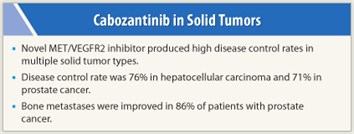Cabozantinib (XL184), an oral inhibitor of MET kinase and the vascular endothelial growth factor receptor (VEGFR2), produced high rates of disease control in several solid tumor types and controlled bone metastases in many patients, according to a phase II study presented at the 2011 ASCO Annual Meeting.1
“Antitumor activity was seen in 12 of 13 tumor types studied to date, and impressive bone scan improvement was observed in prostate cancer,” said Michael S. Gordon, MD, of Pinnacle Oncology Hematology in Scottsdale, Arizona, at a preconference press briefing. “The implications of these results are very exciting. It is unusual to find a targeted therapy, absent of a specific molecular mutation in tumors, that works in bony disease and has this degree of activity.”
MET signaling, which is blocked by cabozantinib, is integral to the process of tumor cell invasion and metastasis in soft tissue and bone.
Discontinuation Design
 The study was a randomized discontinuation open-label trial that included 398 patients with advanced, progressive solid tumors, either with (39%) or without (61%) bone metastases. Patients were treated for 12 weeks with oral cabozantinib and then assessed for tumor shrinkage.
The study was a randomized discontinuation open-label trial that included 398 patients with advanced, progressive solid tumors, either with (39%) or without (61%) bone metastases. Patients were treated for 12 weeks with oral cabozantinib and then assessed for tumor shrinkage.
While the overall major objective response rate was 9%, the disease control rate (partial response or stable disease) was high, Dr. Gordon reported. “Some tumor shrinkage with cabozantinib was observed in the majority of patients,” he said. Disease control rates were highest in hepatocellular carcinoma (76%), prostate cancer (71%), ovarian cancer (58%), melanoma (45%), breast cancer (45%), and non–small cell lung cancer (40%).
Under the study’s discontinuation design, subjects with partial responses stayed on the drug while those with stable disease were randomly assigned to cabozantinib or placebo. Patients with progressive disease were removed from the trial. This design allows for prompt evaluation of the disease-stabilizing activity of cabozantinib, compared with the traditional model of randomizing all patients to the experimental arm or placebo, he explained.
Robust Effect on Metastatic Bone Lesions
 Effects on metastatic bone lesions were observed in five tumor types—prostate cancer, breast cancer, melanoma, renal cell cancer, and thyroid cancer. In patients with prostate cancer, complete or partial responses based on bone scans were seen in 86% of patients. This was often accompanied by pain relief, Dr. Gordon reported.
Effects on metastatic bone lesions were observed in five tumor types—prostate cancer, breast cancer, melanoma, renal cell cancer, and thyroid cancer. In patients with prostate cancer, complete or partial responses based on bone scans were seen in 86% of patients. This was often accompanied by pain relief, Dr. Gordon reported.
“The effect on bone metastases led to pain relief in many patients, and to a reduction in biomarkers of bone resorption, as well as a reduction in biomarkers of bone formation,” he added. Over half the patients had declines of at least 50% in plasma C-telopeptide.
Effects on prostate-specific antigen, however, were minimal. “They do not mirror the benefits on bone scans that tend to appear quickly,” he said.
Patients with anemia had a mean rise of 2.3 g/dL in hemoglobin, which was sustained. Side effects were similar to those seen with other tyrosine kinase inhibitors.
Future Trials
Due to the encouraging results, the prostate and ovarian cancer cohorts were expanded to 150 patients. The larger number will help inform the design of future phase III trials, he said. A clinical trial in medullary thyroid cancer is fully enrolled. A trial in patients with prostate cancer will begin by the end of 2011 and use a reduction in bone metastases as the primary endpoint. ■
Financial Disclosure: Dr. Gordon reported receiving research funding from Exelixis.
Reference
1. Gordon MS, Vogelzang NJ, Schoffski P, et al: Cabozantinib (XL184) has activity in both soft tissue and bone: Results of a phase II randomized discontinuation trial in patients with advanced solid tumors. J Clin Oncol 29(15 suppl):Abstract 3010, 2011.

 Mark G. Kris, MD, Chair of the ASCO Cancer Communications Committee, commented at the press briefing that the study represents “an example of the evolution of targeted cancer therapies in that we are seeing early signs of benefit by going after multiple targets in the cancer cell. We saw important...
Mark G. Kris, MD, Chair of the ASCO Cancer Communications Committee, commented at the press briefing that the study represents “an example of the evolution of targeted cancer therapies in that we are seeing early signs of benefit by going after multiple targets in the cancer cell. We saw important...